* You are viewing Posts Tagged ‘Visualization’
James Brown
November 26, 2012
Conferences and Workshops, Events, Project Updates, Projects and Centres, Videos, Websites and Databases
Tags: AHRC, Databases, Digitization, Union Catalogue, Visualization
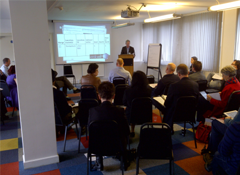
Howard mid-‘yack’
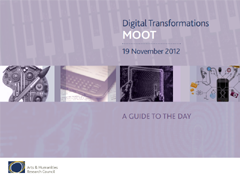
Visit event website
An outing to London last Monday when we presented Early Modern Letters Online at the Digital Transformations Moot, curated and funded by the AHRC. The day long event brought together digital humanists with thinkers and practitioners from other disciplines and sectors ‘to explore the possibilities of the Digital Transformations theme for new and exciting ways of working: to hack, to make, to break’.
The Moot did a great job of showcasing the very wide range of work (and attendant debates) currently being done at the intersection of the humanities and the technical, and in particular in highlighting and fostering new kinds of connections between digital technologies, arts and the humanities, and the creative and cultural industries (the latter being much more strongly represented than is usual at DH gatherings). It was also really interesting from the perspective of event design. Decked out in bracing, challenging terminology – debates were ‘moots’; delegates were ‘mootlings’; papers became ‘yacks’ – the day spread keynote lectures, panel discussions, software demos, and PechaKucha-style talks across multiple tracks and spaces in a kind of freeform digital smörgåsbord that rewarded curiosity and encouraged the creation of individual narratives and serendipitous connections between the sampled components. Further details on the Moot webpage, while the Twitter hashtag was #digitrans; videos of the various live streams will be posted the the webpage shortly.
James Brown
August 29, 2012
Projects and Centres, Websites and Databases
Tags: CKCC, Databases, Digitization, Dutch Republic, History of Scholarship, History of Science, Networks, Seventeenth Century, Visualization
Our good friends and colleagues from Circulation of Knowledge and Learned Practices in the Seventeenth-Century Dutch Republic (CKCC) at Huygens ING in The Hague have a shiny new website. Most excitingly, the revamped site contains a link and extensive supporting documentation for a closed beta (or prototype) of the much-anticipated Epistolarium, a virtual research environment in which users can explore and analyze metadata and full texts of c.20,000 scholarly Dutch letters from the period 1594-1707; see the video above for a rapid-fire introduction. As a long-standing collaborator of CKCC, we’ve been fortunate enough to get a sneak preview of this exciting new resource and will be providing feedback in advance of a full public release (and a resulting edited collection) in 2013. Congratulations to Charles, Guido, Walter, Wijnand, and the rest of the CKCC team!
James Brown
June 12, 2012
Events, Lectures, Podcasts, Project Updates, Websites and Databases
Tags: Digitization, Editions, Electronic Enlightenment, France, Mapping the Republic of Letters, Networks, Text Mining, Visualization
 Podcast available on the seminar page!
Podcast available on the seminar page!
In the fourth paper of our seminar series on Thursday 17 May, Dr Glenn Roe – formerly of the University of Chicago, and current Mellon Fellow in Digital Humanities at Oxford’s OERC – gave a sophisticated and suggestive paper on ‘Text-Mining Electronic Enlightenment: Influence and Intertextuality in the Eighteenth-Century Republic of Letters’.
.
Building on his recent work with the Electronic Enlightenment corpus and other online repositories of long-form historical text, Glenn started his talk by observing the irony that the recent efflorescence of big data, culturomics, network analysis, and other quantitative approaches to culture – focusing in many cases on the macro interpretation of metadata over content – has authorized and promoted a convention of ‘not reading’ within the digital humanities, in which historical texts themselves can be marginalized or effaced altogether by the superabundance of information. The ready modelling of letters as a finite number of abstract datapoints (sender, recipient, and so on) and the vast quantities of diverse and often disorganized information exchanged within epistolary systems makes correspondence highly susceptible to such an approach.
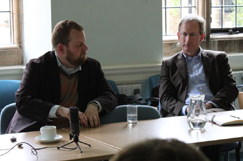
Glenn during discussion.
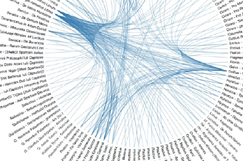
Visualizing influence.
As a supplement to this ‘distant’ reading, Glenn went on to demonstrate the potential of the latest machine-learning technologies to render significant volumes of transcription meaningful via text mining and the automated creation of patterns, frequencies, statistical models, and other forms of ‘mediated’ or ‘directed’ reading. Glenn distinguished between three kinds of text mining: predictive classification (used to generate new categories from unprocessed texts); comparative classification (used to correct and refine existing categories within processed texts); and similarity (used to measure broader similarities between documents and parts of documents, especially in terms of the identification of meaningful borrowing and instances of intertextuality). He then demonstrated each kind of approach within a rich series of examples drawn from his work with the ARTFL Encyclopédie Project, and most recently Electronic Enlightenment, before concluding his analysis by presenting – with caveats – some preliminary radial visualizations of textual influence generated using the D3 JavaScript library.
James Brown
May 22, 2012
Conferences and Workshops, Events, Project Updates, Projects and Centres
Tags: CKCC, Databases, IMPAcT, ImpulsBauhaus, Mapping the Republic of Letters, Networks, Prosopography, The French Book Trade in Enlightenment Europe, Union Catalogue, Union Catalogue News, Visualization, Wikipedia
While Anna Marie was weaving animal magic at the Royal Society, our Technical Director Neil Jefferies and I were headed to the Forzhungszentrum Gotha of the University of Erfurt for an invited workshop on ‘Visualizing Data Resources: The Potential of a Wikimedia Platform for the Digital Humanities’ (27–28 April 2012). Expertly organised by Martin Mulsow, Olaf Simons, and Kristina Petri, and generously funded by Wikimedia Deutschland – the largest and most active of the national chapters – the workshop provided an inspiring forum for a wide range of international participants and projects to share approaches and converge on the question of Wikipedia, the digital humanities, visualizations, and many points in between (see the full description [pdf]).
One set of presentations showcased the Wikimedia community’s own plans for data capture and computational seeing, many of which have great potential for the digital humanities; not always a straightforward relationship, as Olaf discussed in his opening address. These include Wikidata (a collaboratively curated, centralised database of entities designed to support the 280+ language editions of Wikipedia, as well as third-party initiatives, currently under development), and Semantic Mediawiki, an open source extension to Wikipedia capable of (re)organizing the site’s existing content into highly configurable, collectively editable semantic databases. The accumulation and management of structured, actionable (wiki)data within these streamlined platforms will facilitate the creation and deployment of information visualizations across the site’s many interfaces, and by its millions of users in the context of exports and mash-ups.
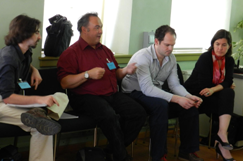
Scott Weingart (Indiana/CKCC), Neil (CofK/Oxford), James (CofK/Oxford), and Nicole Coleman (MRofL/Stanford).
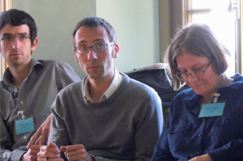
Andreas Wolter (ImpulsBauhaus), Jens Weber (ImpulsBauhaus), and Judith Pfeiffer (IMPAcT/Oxford).
A second cluster of talks focused on the data capture, curation, and visualization techniques and applications being pursued and developed by humanistic projects based in archives, libraries, and universities worldwide. As well as presentations from ourselves and good friends Mapping the Republic of Letters, The French Book Trade in Enlightenment Europe, CKCC, IMPAcT, and Scott Weingart, we heard about (inter alia) linked data and gamification at the University of Colorado; an adaptive, interactive, dynamic historical atlas (AIDA) being created at the University of Erfurt; and the wonderful ImpulsBauhaus initiative based at the the Bauhaus-Universität Weimar. Designed to collect information on and represent the global social networks of the Bauhaus, and led by the designer-developer team Jens Weber and Andreas Wolter in 2009, the project harvested extensive biographical and prospopgraphical data on the movement’s participants and affiliates within a specially designed platform which served as the basis for dynamic network infographics and an interactive three-dimensional table, presented most memorably within an illuminated cube. A video of this extraordinary project opens the post.
As part of their recent strategic alliance with Queen Mary, University of London, the Centre for the Study of the Renaissance at the University of Warwick has announced two Postdoctoral Research Fellowships, one based at Queen Mary and one at Warwick, on the theme of ‘Networks and Information Technologies, 1300-1800’. To form part of the collaborative project ‘Rewiring the Renaissance: Cultural Networks and Information Technologies’, the Fellows will explore modes of communication and networking in the Renaissance period, from letter writing to orality, and develop IT-led modern mechanisms which can capture and analyse the Renaissance communities that were constructed. Projects that explore cultural transmission in any media or European language are welcome; in addition, the Queen Mary Postdoctoral Research Fellow will be expected to have the skills that will allow for an interrogation of the ways in which we communicate historical information in a digital world.
The deadline for applications is Friday, 11 May 2012. For background information on the collaboration, further details about the two posts, and to apply, please visit the project webpage. Please send informal enquiries to Dr Penny Roberts.
James Brown
January 30, 2012
Events, Front Page, Project Updates, Videos
Tags: CKCC, Databases, Digitization, Geography, Mapping the Republic of Letters, Networks, Spatial Theory, Union Catalogue, Union Catalogue News, Visualization

Videos of twenty-one papers and keynotes from our 2011 conference Intellectual Geography: Comparative Studies, 1550-1700 (Oxford, 5-7 September 2011) are now available on the conference website or via our Vimeo channel (with more hopefully to come). Organised by Howard Hotson, the event introduced and tested the novel concept of ‘intellectual geography’ as a means of appreciating and understanding the organisation of intellectual activity and the dissemination of ideas within space and across time, from the sixteenth to the eighteenth centuries. A taster – Miles Ogborn‘s keynote exploration of ‘What is Intellectual Geography?’ – is provided below. Happy viewing!









 Join
Join 